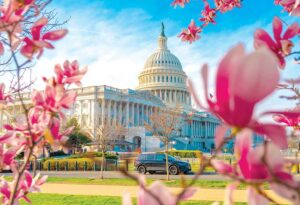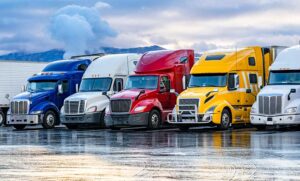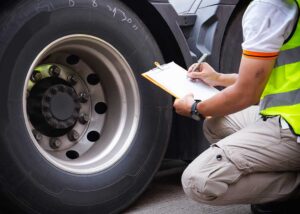In a year that has already seen a pandemic accompanied by an economic collapse, U.S. voters will select the president and vice president, along with 35 Senate seats and all 435 House of Representative seats in an election that could have historic significance to the trucking industry.
Most polling data puts Democratic challenger Joe Biden and his running mate California Sen. Kamala Harris ahead of incumbents Donald Trump and Mike Pence. Those polls were taken prior to Biden announcing his running mate on August 11.
In the Senate, Republicans hold a majority of 53-45, plus two independents who caucus with the Democrats. Twenty-three of the 35 contested seats are currently held by Republicans, with only
12 by Democrats. Four incumbent senators, three of them Republican, have announced retirement plans. A change of four seats could give Democrats control of both houses of Congress, since they already enjoy a comfortable 234-197 advantage in the House.
Economy: Polar opposite views on tax cuts
It’s no surprise that the parties are divided on many issues, including some that could have a great impact on trucking. The Trump campaign claims credit for an economy that set records for low unemployment and the longest period without a recession in U.S. history, prior to the COVID-19 pandemic. Perhaps the largest issue of the upcoming election is how to return the economy to pre-pandemic levels.
Republicans credit personal and corporate tax cuts initiated by the Trump administration for the booming economy. Their platform, a continuance of the platform adopted for the 2016 election, cites tax cuts as a primary economic stimulator.
The proposed Democratic platform calls for a reversal of Trump administration tax cuts, including corporate taxes, as well as increases on estate taxes. Other proposed tax actions would increase the Earned Income Tax Credit and Child Tax Credit.
It should be noted that the official platforms of each party are generally finalized and voted on at their respective conventions. How that will work this year, given COVID-19 risks, has yet to be determined.
Democrats want significant changes to labor laws
The Democratic platform calls for some significant changes to labor laws that would impact the trucking industry. The platform proposes a raise of the minimum wage to $15 an hour which may impact the non-driving employees of some carriers.
Also proposed is 12 weeks of paid family medical leave for every employee for health issues, including childbirth.
The impact of wage and medical-leave changes will be even greater if another Democratic proposal is adopted. The platform addresses “misclassified employees,” an issue that has already impacted carrier relationships with independent contractors in California and other states. The platform calls for national passage of legislation similar to the “AB5” law that went into effect in California on January 1, 2020.
The platform also calls for adoption of the Protecting the Right to Organize (PRO) Act, which passed the House in February. This would weaken or eliminate “right to work” laws and ease approval of union representation for employees.
Little hope for infrastructure bill in near future
Infrastructure is a huge area of interest to trucking where the parties vary widely. Both parties pontificate about the terrible condition of roads and bridges, and both claim something must be done. The disagreement comes with the details.
In his early days in office, Trump proposed a $2 trillion infrastructure plan that gained little support. Republicans said it was far too expensive. Democrats claimed it didn’t provide enough funding for “green” initiatives, as well as economic justice projects and other party favorites.
With the election looming, Democrats in the House put infrastructure on the table with the INVEST in America Act, a $494 billion proposal that addressed mostly transportation-related issues. The bill gained wide support in the industry until it was amended to include a requirement to raise the current $750,000 minimum financial responsibility level for carriers to $2 million.
Then the bill was folded in to the $1.5 trillion Moving America Forward Act, which the House approved along party lines in early July. Senate Republicans accused the Democrats of pandering to their liberal base, vowing that the bill would not be taken up in the Senate.
A few weeks later, Trump announced that his administration is working on a $1 trillion infrastructure proposal that has not yet been formally presented to Congress.
Truckload Carriers Association Vice President of Government Affairs David Heller addressed the Moving America Forward Act. “The Senate will need to weigh in, but they are tied up with another stimulus package,” he said. “I don’t see an infrastructure program getting done before the election.”
Heller pointed out that there were 13 continuing resolutions extending MAP-21 before the current infrastructure policy, the FAST Act, was approved. “I think that’s what will happen with FAST,” he said, “and they’ll try to get a deal done when the new Congress comes in.”
Parties differ on energy dependence, too
The parties differ on energy independence, too. Democrats call for building 500 electric charging stations, along with investment in alternative energy resources. Republicans call for the greater use of current American energy resources such as coal and natural gas.
Both parties have called for increased spending to make high-speed internet accessible to more Americans.
The Environmental Protection Agency (EPA) looms large in both platforms, with Democrats vowing to strengthen environmental safeguards while Republicans complain of regulations that they say add an unreasonable burden to the permitting process. Recently, the White House took credit for reducing or eliminating 850 government policies that they claim were impediments to economic recovery.
While a plan for economic recovery is crucial, COVID-19 infection rates continue to rise. It isn’t known yet if infection can reoccur, and a vaccine is still to come. Each party’s plan for ending the pandemic will determine when true economic recovery can begin.
The Democratic platform calls for making COVID-19 testing widely available and free to everyone. The pandemic is cited in calls for universal health care and expansion of Medicaid programs.
Republicans favor using the power of the marketplace. Their platform pledges to restore control to the American people.
With Congress tied up in bickering over another economic stimulus package, topics like infrastructure, labor law, and energy independence remain for later discussion. Even in these strange times, however, the positions of both parties are clear enough to make decisions about whom to support in the voting booth.
Cliff Abbott is an experienced commercial vehicle driver and owner-operator who still holds a CDL in his home state of Alabama. In nearly 40 years in trucking, he’s been an instructor and trainer and has managed safety and recruiting operations for several carriers. Having never lost his love of the road, Cliff has written a book and hundreds of songs and has been writing for The Trucker for more than a decade.









So from what you are saying here is that the dems want to get control of the virus and make things safer for us drivers and the public; And the Republican Party want us drivers to put our heath at risk and our family’s lives at risk for the marketplace,,,The economy;;;the stock market;;; I’m a life long republican::: This year I am voting for truth not fiction and not for the stock market or the marketplace I will be voting for a healthy and stronger America; I will be standing with the Democratic Party this year;;
How’s that working out for you now. Sleepy shut down the pipeline. Smart move